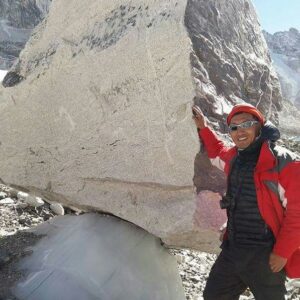Sherpa guide in nepal

Sherpa Guide in Nepal: The Backbone of Himalayan Mountaineering Sherpa guides in Nepal are renowned worldwide for their exceptional mountaineering skills, deep knowledge of the Himalayan terrain, and unwavering dedication to ensuring the success and safety of climbing expeditions. These remarkable individuals are not just guides; they are the lifeline for climbers attempting to conquer some of the world’s highest peaks, including Mount Everest. Here’s an in-depth look at the role, significance, and challenges of Sherpa guide in Nepal.
1. Ethnic Background and Heritage
The Sherpa people are an ethnic group native to the mountainous regions of Nepal, particularly the Solu-Khumbu district, which includes the Everest region. Originating from Tibet over 500 years ago, the Sherpas have developed a unique culture and way of life deeply intertwined with the high-altitude environment. Their name, "Sherpa," literally translates to "eastern people," reflecting their Tibetan roots. Today, Sherpa guides in Nepal are synonymous with mountaineering excellence, drawing on centuries of experience living and working in the Himalayas.2. The Role of Sherpa Guides in Mountaineering
Sherpa guides in Nepal play a critical role in climbing expeditions. They are responsible for a wide range of tasks, including carrying heavy equipment, setting up camps, fixing ropes, and navigating treacherous sections of the mountains. Their expertise is invaluable in ensuring the safety and success of climbers, particularly in high-altitude environments where conditions can change rapidly. Without the support of Sherpa guides in Nepal, many expeditions would struggle to reach their goals.3. Physiological Adaptations to High Altitudes
One of the most remarkable aspects of Sherpa guide in Nepal is their physiological adaptation to high altitudes. Over generations, Sherpas have developed greater lung capacity, more efficient blood oxygenation, and a higher tolerance for low oxygen levels. These adaptations allow them to perform strenuous tasks at elevations where most climbers would struggle. This natural advantage makes Sherpa guides in Nepal indispensable for high-altitude expeditions.4. Training and Certification
While Sherpas have innate skills honed by their environment, many also undergo formal training to enhance their mountaineering expertise. Organizations like the Nepal Mountaineering Association (NMA) offer certification programs that cover advanced climbing techniques, first aid, and rescue operations. This training ensures that Sherpa guide in Nepal are well-equipped to handle the challenges of high-altitude climbing and provide the best possible support to their clients.5. Cultural Significance and Historical Contributions
Sherpa guides in Nepal hold a special place in the history of mountaineering. Their contributions have been pivotal in many historic climbs, including the first successful ascent of Mount Everest in 1953 by Sir Edmund Hillary and Tenzing Norgay Sherpa. Tenzing Norgay, a Sherpa guide in Nepal, became a global icon, symbolizing the courage and skill of the Sherpa people. Today, Sherpa guides continue to play a vital role in maintaining Nepal’s reputation as a premier destination for mountaineering.6. Challenges Faced by Sherpa Guides
Despite their critical role, Sherpa guide in Nepal face significant challenges. The work is inherently dangerous, with risks such as avalanches, crevasses, and extreme weather conditions. Additionally, the job is seasonal, relying heavily on the tourism industry, which can be unpredictable. Many Sherpas also struggle with inadequate wages, lack of insurance, and limited access to education and healthcare for their families. These challenges highlight the need for greater support and recognition for Sherpa guide in Nepal.7. Recognition and Advocacy
In recent years, there has been a growing effort to improve the working conditions and recognition of Sherpa guide in Nepal. Organizations and climbers are advocating for better wages, insurance coverage, and educational opportunities for Sherpas and their families. Initiatives like the Sherpa Future Project aim to empower Sherpa communities by providing scholarships and vocational training. These efforts are crucial in ensuring that the legacy of Sherpa guides in Nepal continues to thrive.8. The Future of Sherpa Guide in Nepal
As mountaineering continues to grow in popularity, the demand for skilled Sherpa guide in Nepal is likely to increase. However, it is essential to balance this demand with sustainable practices that protect the environment and support the Sherpa community. By investing in the well-being and development of Sherpa guide, Nepal can ensure that its mountaineering industry remains a source of pride and economic opportunity for generations to come.The economic impact of Sherpa guides in Nepal's tourism sector cannot be overstated. Their expertise attracts thousands of international climbers annually, contributing significantly to local economies. However, this success brings challenges, including:
- The need to address working conditions and insurance coverage
- Managing the environmental impact of increased tourism
- Preserving traditional Sherpa culture while embracing modern opportunities
- Ensuring fair wage distribution and professional benefits
- Developing sustainable tourism practices that benefit local communities
-
Looking ahead, the future of Sherpa guiding in Nepal depends on implementing comprehensive policies that:
- Protect workers' rights and safety
- Support educational opportunities for aspiring guides
- Promote responsible tourism practices
- Preserve cultural heritage
- Invest in infrastructure and emergency services
Climate change presents another significant challenge, as melting glaciers and changing weather patterns affect traditional climbing routes. Sherpa guides are often the first to witness these environmental changes, making their observations invaluable for climate research and adaptation strategies.